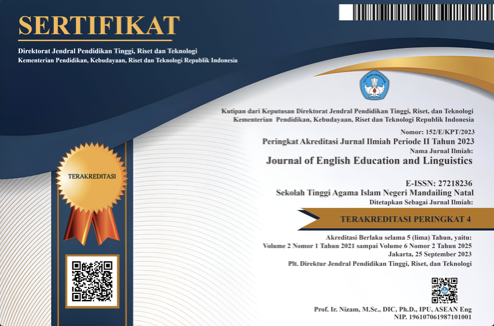TEACHERS’ DIFFICULTIES IN TEACHING READING COMPREHENSION OF THE SEVENTH GRADE STUDENTS
DOI:
https://doi.org/10.56874/jeel.v4i2.1389Keywords:
teachers' difficulties, teaching reading comprehensionAbstract
This article was conducted to find out the teachers’ difficulties in teaching reading comprehension of the seventh-grade students at SMPN 22 Palembang. The research design used in this study was descriptive qualitative method. The participants in this study were two English language teachers who teach in grade seventh at SMPN 22 Palembang. The data were collected using a semi- structured interview with open-ended questions. Then, data from interviews was analyzed using thematic analysis in this study as part of the analysis. After analyzing the data, the findings showed that there are five difficulties that teachers face when teaching reading comprehension in seventh grade students at SMPN 22 Palembang, as follows: (1) students’ lack of motivation, (2) limited instructional time, (3) lack of background knowledge (4) students’ limited vocabulary, and (5) lesson plan constraints. Therefore, this research discusses the difficulties experienced by English teachers in seventh grade, thus it is hoped that readers especially English teachers who experienced similar difficulties can use this research to increase their variety of learning activities and overcome the difficulties they are faced.
References
Abdurrahman, M. (2012). Anak berkesulitan belajar teori, diagnosis, dan remediasinya. Rineka Cipta.
Afriani, A. (2021). Teachers difficulties in teaching reading comprehension during online classroom. [Undergraduate thesis, Jambi University]. Jambi University
Ampofo, A., J. (2019). Investigating reading difficulties among class six pupils of wa basic school complex. Lambert Academic Publishing.
Braun, V., & Clarke, V. (2006). Using thematic analysis in psychology. Qualitative research in psychology. Scientific Research Publishing. 3(2). 77-101.
Cresswell, J. W. (2012). Educational research planning, conducting, an evaluating quantitative a qualitative research (4th ed.). Pearson.
Dhasmara, D. (2020). The difficulties in teaching reading comprehension in rural school. [Diploma Thesis, IKIP PGRI Pontianak]
Moswane, A. P. (2019). Teachers’ challenges in teaching reading to english first additional language learners: A case study of seshego high schools. [Thesis for Doctor of Philosophy Degree, University of Limpopo] University of Limpopo.
Nisa, R., Safura, S.S., & Wicaksono, D.F. (2018). Students’ ability in mastering reading comprehension. English Education Journal, 5.
Silfia, B. N., Panagiotis, Z., Ramon, F.G., & Demetrios, G. S. (2016). Developing teachers “Competences for designing inclusive learning experiences”. Journal of Educational Technology & Society, 17–27.
Winarni, W., D. (2018). Teori dan praktik penelitian kuantitatif kualitatif. Bumi Aksara.
Downloads
Published
Issue
Section
License
All articles published in the Journal of English Education and Linguistics are licensed under a Creative Commons Attribution-ShareAlike 4.0 International (CC BY-SA) license. This means anyone is free to copy, transform, or redistribute articles for any lawful purpose in any medium, provided they give appropriate attribution to the original author(s) and Journal of English Education and Linguistics, link to the license, indicate if changes were made, and redistribute any derivative work under the same license.
Copyright on articles is retained by the respective author(s) without restrictions. A non-exclusive license is granted to the Journal of English Education and Linguistics to publish the article and identify itself as its original publisher, along with the commercial right to include the article in a hardcopy issue for sale to libraries and individuals.
Although the conditions of the Creative Commons Attribution-ShareAlike 4.0 International (CC BY-SA) license do not apply to authors (as the copyright holder of your article, you have no restrictions on your rights), by submitting to the Journal of English Education and Linguistics, authors recognize the rights of readers and must grant any third party the right to use their articles to the extent provided by the license.

This work is licensed under a Creative Commons Attribution-ShareAlike 4.0 International License.








